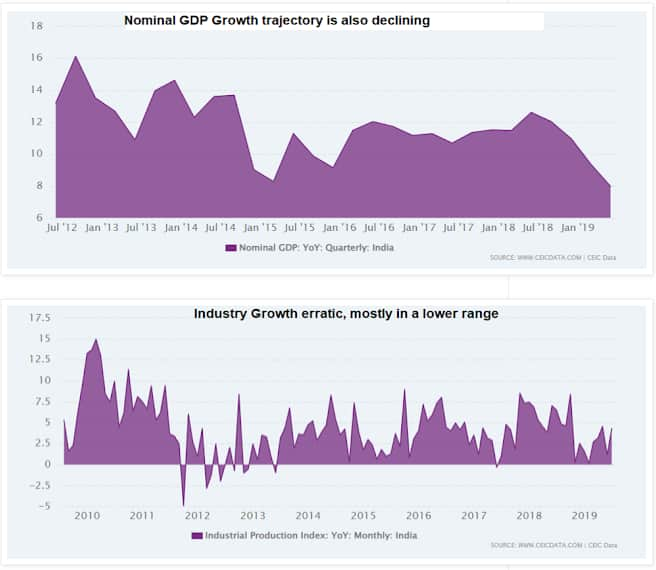
Pradeep Gupta of Anand Rathi Group.
After the recent significant correction, Pradeep Gupta of Anand Rathi Group thinks that the markets have priced in the major part of the global risks.
Thanks to the recent strong earnings growth, valuations of Indian equities have become reasonable to attractive, and hence, the outlook for the Indian economy and markets is positive in the medium to longer term, the Co-founder & Vice Chairman at Anand Rathi Group says.
With over two decades of rich experience in financial markets, Pradeep feels that the biggest hidden opportunity is in remaining invested in equities in the face of near-term negative market sentiments and corrections.
Are you constructive on the equity markets though globally uncertainties are many? What are the key risks that can still create uncertainty and dampen equity market sentiments?
Technical recession in the US means two subsequent quarters of negative GDP growth. While the possibility of a technical recession in the US is very high, the likelihood of a full-scale recession either in the US or globally remains rather low.
The forecast by the International Monetary Fund (IMF) suggests a serious slowdown in growth but not a global recession. In the short term, the outlook for Indian equities remains tied to the global developments. Globally, still there are lots of risks, including aggressive monetary tightening, rapid liquidity withdrawal, discontinuation of fiscal stimulus measures adopted in the past, geopolitical uncertainties and elevated commodity prices.
Also read – Blackstone eyes IPO filing for $ 2.5 billion India mall portfolio
The global equity markets as well as Indian equities have corrected in response to these negative developments. So, I think that the major part of the global risks is already in price. Meanwhile, the fundamentals of the Indian economy and the corporate sector remain robust. Domestic liquidity flow towards the equity market, especially in the form of systematic investment plans (SIPs) to mutual funds continues to remain buoyant. With the recent strong earnings growth, coupled with the market correction, the valuations of Indian equities have become reasonable to attractive. In view of all these, I think the outlook for the Indian economy and markets is positive in the medium to longer term.
Also read – Lakshmi Mittal-backed Arcelor Mittal Nippon Steel to buy some infra assets from Essar for Rs 19,000 crore
Given the improvement in NPAs, capital adequacy ratio at 20-year high, and improving credit growth, should one add banks to the portfolio?
Once again I will desist from giving any short-term sectorial recommendations regarding these. We maintain a positive outlook on Indian equities and continue to be positive on banking as a sector.
Is it the time to bet on mid-caps despite high valuations, or small-caps, which are reasonably valued compared to large-caps?
I believe that investors should stick to their allocation strategy and invest as per their objective. Equities, as an asset class is highly volatile in the short term. Yet, the risk adjusted longer-term returns on equities are generally much higher than any other asset class. This simple fact is often ignored by investors resulting in significant losses through speculation and attempts to time the market. So, I feel that the biggest hidden opportunity is in remaining invested in equities in the face of near-term negative market sentiments and corrections.
Are you worried on the FMCG space as we have not seen enough rains in several parts of the country which can impact rural income?
Indian villages, which contribute about 35 percent to the overall sales in the FMCG sector, is a crucial contributor for revival of this sector. Rainfall deficit is now estimated to be only around 5 percent. Thus, the impact on the industry shouldn’t be as high as anticipated earlier.
Also read – Stock trader’s guide to oil-to-retail giant RIL’s AGM
Do you expect any kind of earnings downgrades in the coming quarters, as we are not out of the woods yet on the inflation front?
The link between inflation and the consequent monetary policy and equity market performance is non-linear. Very high inflation generally results in equity market correction, and so does very low inflation.
During the moderate phase of inflation, equity returns go up along with rising inflation. This happens because during such phases corporate earnings generally rise faster than overall inflation, and thereby corporate margins also improve.
The likely softening of global inflation from the current elevated levels can result in some level of equity market correction. But this is positive for longer-term sustainability of healthy equity returns as inflation gets stabilised.
High interest rate impacts the equity market through different channels. It increases the debt servicing burden of the corporate sector, and therefore depresses corporate earnings, which is negative for equity markets. More importantly, increase in interest rate results in increase in the rate at which future corporate earnings are discounted so as to arrive at a discounted cash flow based valuation of a corporate. Higher discounting rate results in lower valuation of companies which is negative for the equity markets.
That said, higher interest rate also can result in higher future cash flow of a corporate resulting in higher value of future earnings. The discounted cash flow based valuation therefore, depends on the extent of upward revisions in both earnings and discounting rate.
In practice, however, the impact of higher interest rate on equity market performance is only marginally negative. The significant equity market corrections since October 2021 seem to have factored in a large part of the impact of inflation and higher interest rate on the corporate sector. Therefore, unless the future inflation and monetary tightening is more than what is being currently expected I feel the major part of the impact is already in price.
Disclaimer: The views and investment tips expressed by investment experts on Moneycontrol.com are their own and not those of the website or its management. Moneycontrol.com advises users to check with certified experts before taking any investment decisions.

